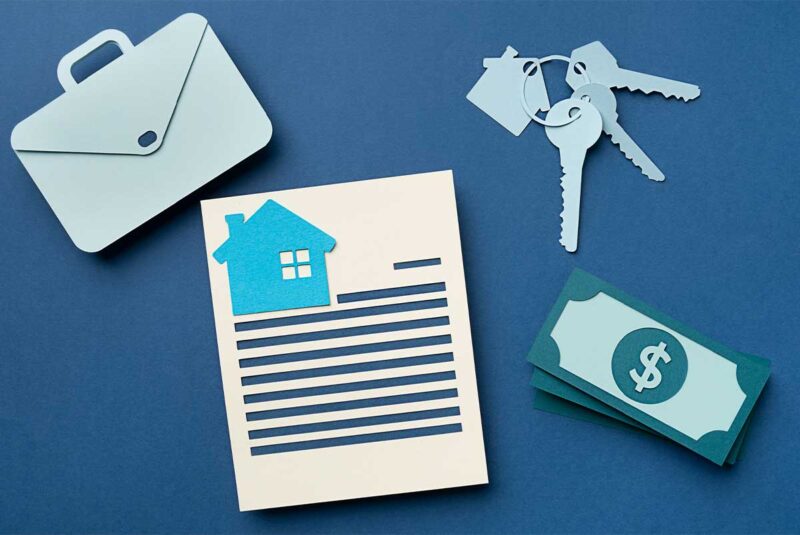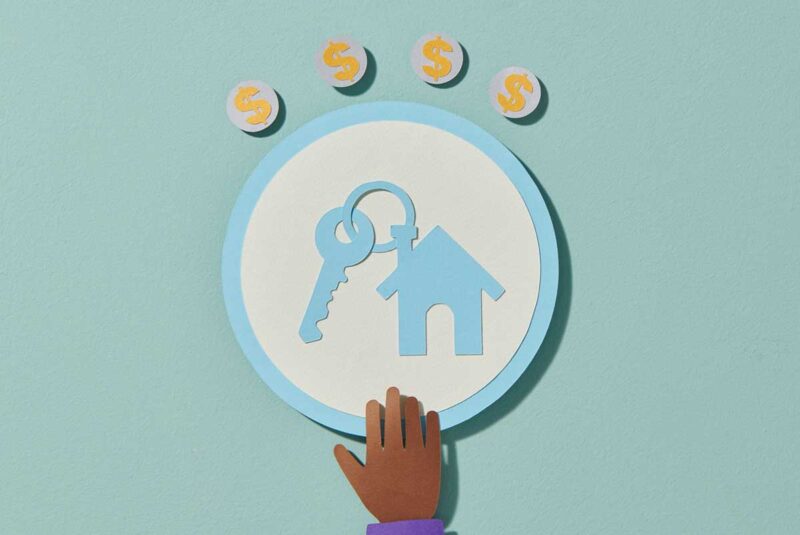Ready To Buy a Home?
Get Approved to Buy a Home
Rocket Mortgage® lets you get to house hunting sooner.
For many of us, the American economy has felt like a rollercoaster lately. Interest rate hikes have become the new normal, and you can’t seem to escape inflation in stores or on the news.
If you’re trying to buy a house, you’re probably wondering how interest rates and inflation will affect your home buying aspirations. To get a grip on what’s happening, you need to understand this key rate: the federal funds rate (aka the fed funds rate).
The federal funds rate is the interest rate banks and lending institutions pay to borrow money from each other for overnight loans. And the Federal Reserve Bank (aka The Fed) – our nation’s central bank – sets the rate.
Understanding the Federal Funds Rate
The Federal Open Market Committee (a branch of the Federal Reserve) meets eight times a year to review monetary policy and decide whether the federal funds rate target will change. The Fed generally hikes the fed funds rate to cool inflation and slow down the economy (think: get consumers to stop spending so much). And the Fed typically lowers the fed funds rate to stimulate economic growth (think: get consumers to open their wallets again).
For example, the Fed slashed the federal funds rate to record lows of 0% – 0.25% to stimulate economic activity during the 2008 Great Recession.[1] They did the same in 2020 during the COVID-19 pandemic to boost the economy and avoid a financial crisis.
By the way, the federal funds rate isn’t the same as interest rates – the federal funds rate applies to loans between banks; interest rates apply to loans between lenders and consumers.
Consumer loan interest rates aren’t set by the Fed, but they are heavily influenced by the federal funds rate. When the Fed raises the fed funds rate, it gets more expensive to borrow money, and short-term interest rates go up. Interest rates usually drop when the rate drops, and it’s cheaper to borrow money.
Federal discount rate
The federal discount rate is another number set by the Fed that applies to banks. It’s the interest rate banks pay to borrow money from the Fed. The rate is usually slightly higher than the federal funds rate to encourage banks to borrow from each other instead and promote more activity in the economy.
What Does the Federal Funds Rate Mean for Mortgage Rates?
The mortgage market and fed funds rate generally move in the same direction. Sometimes one leads while the other follows. Today, mortgage interest rates are slowly climbing in response to federal funds rate increases.
It’s totally understandable that first-time home buyers may feel anxious about buying a home while interest rates are ticking up. You can’t control what the Fed decides on interest rates, but you can decide to lock in the interest rate on your mortgage. If your interest rate isn’t locked in before you close, the rate could go up and make your once-affordable mortgage unaffordable. It’s always a good idea to budget for potential rate changes and give yourself some wiggle room.
While the fed funds rate will influence your mortgage rate, it’s not the only variable that influences your rate. Your credit score is another major factor that plays a role in the interest rates a lender offers.
Pro tip: The higher your credit score is, the likelier it is a lender will offer lower interest rates.
How to respond to mortgage rate changes
With mortgage rates on the rise, developing a strategy to buy a home can help you secure the best rates available. Consider these home buying strategies:
- Increase your down payment: The larger your down payment is, the less you need to borrow and the lower your monthly mortgage payments will be. And it shows your lender you’re a less risky borrower, potentially lowering your interest rate.
- Explore different loan products: If a conventional loan is too expensive, you may qualify for a government-backed loan, such as a Federal Housing Administration (FHA) loan or a U.S. Department of Agriculture (USDA) loan. Your lender will discuss different loan options with you during the application process.
- Search for a more affordable property: If your dream home is out of your price range, consider looking at fixer-uppers or homes with an extra bedroom you can rent to help pay your mortgage payments.
- Choose a shorter-term loan: If you can afford higher monthly mortgage payments, a 15-year loan will have a lower interest rate than a 30-year mortgage, and you’ll pay less interest over the life of the loan.
- Buy down mortgage points: You can decrease your interest rate with every discount mortgage point you buy. One mortgage point – which equals 1% of your total mortgage amount – will reduce your interest rate by about 0.25%.
- Shop around for lenders: Finding the best lender for your needs is a key part of the home buying process. You should never feel pressured to work with the first lender you meet. Interest rates and quality of service will vary by lender. Do yourself a favor and shop around.
How Does the Federal Reserve Determine the Federal Funds Rates?
There is nothing arbitrary about the federal funds rate. The Fed considers a wide range of factors before making any changes, including a review of key economic indicators, like major events, the core inflation rate and the durable goods orders report (a monthly survey that measures current industrial activity).
If the goal is to get consumers to spend, the target rate is reduced. If the goal is to slow down inflation, the federal funds rate is raised.
Current federal funds rate
On September 21, 2022, the Federal Reserve raised the target benchmark fed funds rate to a range of 3% – 3.25% (an increase of 75 basis points from the July rate of 2.25% – 2.5%).
Financial analysts predict a peak federal funds rate of 4.5% – 4.75% by February 2023,[2] so higher interest rates are coming.
Rate hikes are no reason to give up on your dream of homeownership. They are an opportunity to be resourceful. The more you understand about mortgage qualifications and approvals, the better equipped you’ll be to buy a home you can afford despite rising interest rates.
Federal Funds Rate FAQs
Credit card interest rates are based on the current prime rate – which is the lowest rate you’re charged to borrow money. The prime rate typically follows changes in the fed funds rate. If you haven’t noticed it yet, your card issuers have probably increased the APR on your credit cards, making it more expensive to buy and pay off your credit card bills.
Historical data shows that the stock market is sensitive to changes in the federal funds rate. During rate hikes, we usually experience a bear market (price declines). If we see a true bear market soon, you’ll need to decide whether investing in stocks makes sense for your financial situation.
Not to sound like a broken record, but rate hikes are no reason to give up on buying a home. If you can apply strategies that allow you to buy an affordable home, you don’t have to give up on your home buying aspirations. While it doesn’t matter whether interest rates are 3% or 13%, the best time to buy a home is always when you can afford it. Waiting is a legit strategy, but no one can predict how long you’ll be waiting.
ARMs have an attractive lower rate at the start of the loan (typically anywhere from 5 – 10 years). But once the intro period ends, the loan’s interest rate will adjust to reflect the market interest rate. An ARM is a good choice for buyers who don’t plan on staying in a home for very long. You can work with a real estate professional to evaluate the pros and cons of an ARM.
When the Fed Meets, Mortgage Rates Can Change Overnight
If you’re an aspiring home buyer, keep your eye on the housing market and interest rates. The federal funds rate has been rising to combat inflation and will likely continue its upward trend for the time being. Making sure you’re prepared for potential changes in the home buying process means making sure you understand your buying power.
Get approved to buy a home.
Rocket Mortgage® lets you get to house hunting sooner.
The Short Version
- The federal funds rate is the interest rate banks and lending institutions pay to borrow money from each other for overnight loans
- If the goal is to get consumers to spend, the federal funds rate is reduced. If the goal is to slow down inflation, the rate is raised
- The federal funds rate applies to loans between banks; interest rates apply to loans between lenders and consumers
Federal Reserve. “Policy Tools.” Retrieved October 2022 from https://www.federalreserve.gov/monetarypolicy/openmarket.htm
Reuters. “Goldman, Barclays, SG raise Fed rate projections.” Retrieved October 2022 from https://www.reuters.com/markets/asia/goldman-barclays-sg-raise-fed-rate-projections-2022-09-22/




